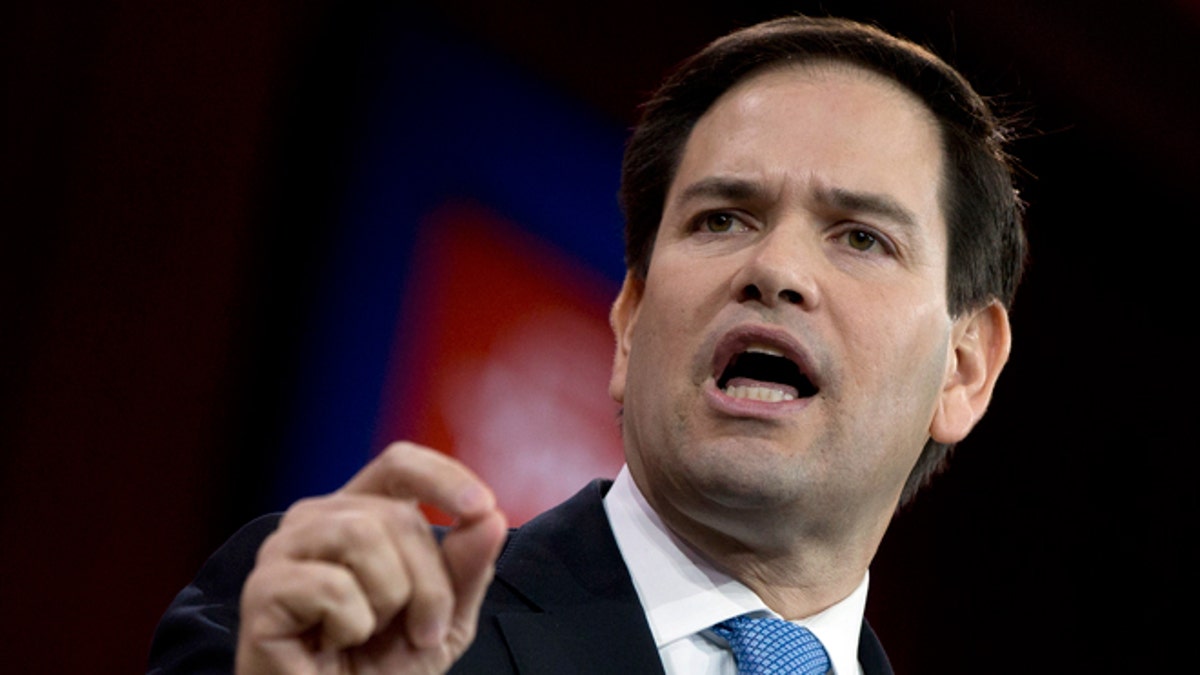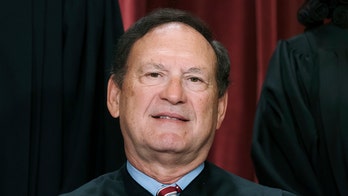
(AP Photo/Carolyn Kaster)
Marco Rubio's Republican presidential bid is getting a surprisingly big boost from a little-known legislative tweak he helped tuck into last year's spending bill — one that ObamaCare critics are crediting with shielding taxpayers from jittery health insurance companies that may be eyeing shaky bottom lines.
The provision, similar to one he’s pushing this year, prohibits billion-dollar bailouts for private insurers under the Affordable Care Act.
It's now being touted by Rubio’s camp and others as a key factor that is protecting taxpayer dollars -- while also disrupting the law itself.
Rep. Darrell Issa, R-Calif., former chairman of the House oversight committee, cited the provision in announcing his endorsement of Rubio on Monday.
“He saved us money on ObamaCare where others have simply wanted to repeal it,” Issa told Fox News. “He has already saved $2.5 billion by eliminating an unreasonable backstop by the taxpayers for a failed program.”
The program Rubio targeted is known as “risk corridors” – pricy provisions that allow the government to use taxpayer dollars to compensate insurance companies for losses suffered during the first few years of ObamaCare.
In 2013, the senator pushed legislation to repeal the risk corridor provision. Though the standalone bill failed, he had a hand in getting a rider into the “must-pass” omnibus federal spending bill last year that prevents the government from making up shortfalls in the program by tapping other funds.
Last year, insurers asked for nearly $2.87 billion in government payments from the program; though the Department of Health and Human Services had only $362 million available. Issa and others say the rider, then, helped save $2.5 billion.
Concern about a backstop for losses has been renewed amid continuing financial uncertainty in the market -- which has led to more than a dozen folded co-ops and prompted UnitedHealth, the country’s largest insurer, to threaten to pull out of the exchanges next year.
Rubio's campaign is claiming some credit for the turmoil, sending out a recent tweet that said: “Q: Did Marco Kill Obamacare? A: You bet he did.”
UnitedHealth’s CEO announced $425 million in losses and warned it may walk away from the health care exchanges altogether. It’s a threat Rubio believes will resonate with other insurers who he thinks may follow suit.
“I think it’s only going to accelerate now, because once these companies can’t get bailed out, many of them are deciding they no longer want to participate in the ObamaCare exchange,” he said in an interview with Breibart News.
Rubio wants to keep his restrictions in place going forward, as they are set to expire if not renewed.
In a Nov. 24 letter to Republican leadership, he argued that ObamaCare might not be worth saving if such deep safety nets are needed to keep private insurers interested.
He added, “It is our responsibility to completely shield the U.S. taxpayer from a deal in the omnibus that might reimburse health insurers retroactively for these losses or any other future losses.”
America’s Health Insurance Plans President and CEO Marilyn Tavenner, who played a key role in launching the health care overhaul in the Obama administration, recently defended the risk corridors.
“Stable, affordable coverage for consumers depends on adequate funding of the risk corridor program,” she said in an October statement. “It’s essential that Congress and CMS act to ensure the program works as designed and consumers are protected.”
Dan Holler, vice president of communications at Heritage Action for America, disagrees.
Holler told FoxNews.com his organization strongly supports eliminating bailouts for insurance companies and believes a similarly worded measure by Rubio will easily pass this year.
While Rubio’s social media team is claiming credit for delivering a death blow to ObamaCare, others argue it only did surface-level damage to the program.
Still, most agree Rubio’s efforts have had some impact on ObamaCare.
“It did draw some blood,” Tim Jost, a health law professor at Washington and Lee University School of Law, told Bloomberg News. “The restriction on funding is probably the most effective thing Republicans have done so far to limit the Affordable Care Act, other than the Supreme Court decision and subsequent decisions by Republican states not to expand Medicaid.”
FoxNews.com's Barnini Chakraborty contributed to this report.




